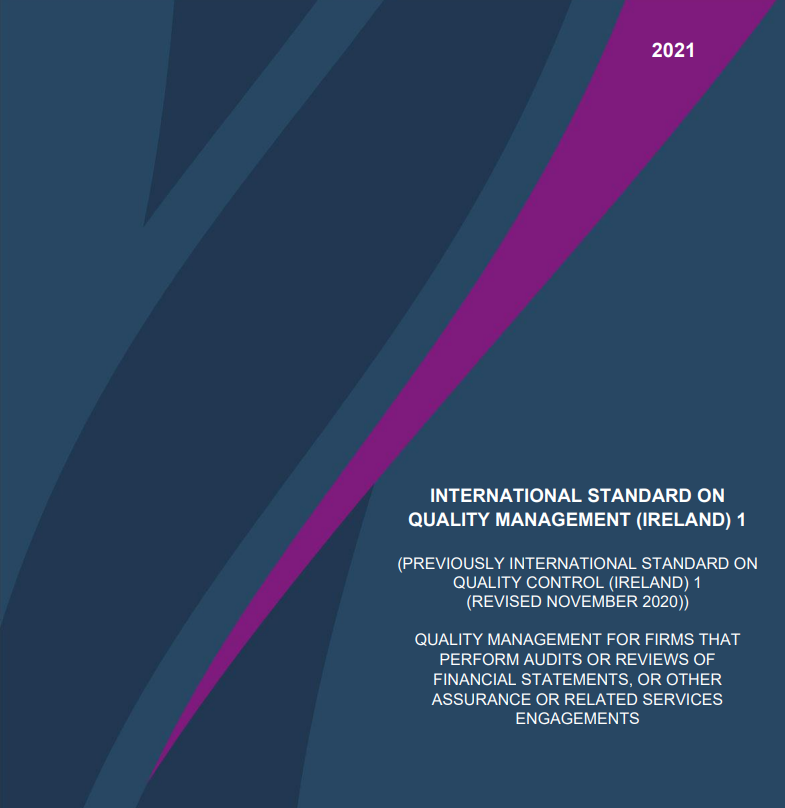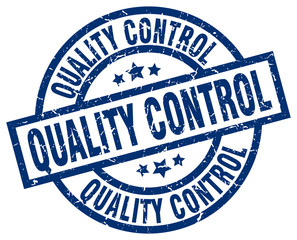
by John McCarthy Consulting Ltd. | Sep 19, 2022 | Blog, News
Around the globe, auditors are preparing for the imminent ISQM 1 regime, and it’s now just under three months to the deadline – 15 December 2022. On or before this date every Irish audit firm will need an ISQM-compliant System of Quality Management (‘SOQM’).
While larger firms have been working for many months to prepare for ISQM 1, we’re aware that many smaller firms are only just beginning the journey towards compliance and the last thing they might welcome is a reminder that time is running out!
Our new ISQM TOOLKIT is the answer to your needs and is available to purchase now for immediate download to help get you started. Click here for more details.
If you’re tempted to conclude that you’ve left it too late to meet the deadline, our message is: don’t despair. There is still opportunity to get ready, although it’ll mean setting aside dedicated partner time to achieve this, and regulators will be looking for clear evidence of progress by the end of the year and certainly by this time in 2023.
Here are our top ten tips to helping you get your SOQM across the finish line:
- Read the ISQM. There’s really no way around this! We’d recommend you also get hold of the IAASM Implementation Guide, which is genuinely helpful – although be warned; this is for the international version of the ISQM and doesn’t include the additional quality responses added to the Irish standard by the Irish Audit & Accounting Supervisory Authority (IAASA).
- Assess your current approach to audit quality. Firms aren’t (usually!) starting from scratch on audit quality and will have various policies and procedures already in place. While we want to stress that you shouldn’t simply ‘bolt on’ ISQM to your existing approach, it’s helpful to get a clear insight into what’s happening now (e.g., by taking a look with a critical eye at your existing ISQC 1 but being careful not to copy and paste the answers, but what’s in the ISQC1 may be helpful).This may mean gathering various documents (like staff appraisals, CPD plans and IES 8), clarifying existing arrangements with the rest of the team and organising your thoughts.
- Find out what your team thinks about your current approach. Chances are, you and your team already have sound insights into what’s working well and what isn’t, and some honest feedback may be painful but is essential to making progress.John McCarthy Consulting Ltd. (working in conjunction with our colleagues in Apex Professional Consulting Ltd.) has produced the ISQM TOOLKIT for the Republic of Ireland. It comes with a team questionnaire that can help you to gather anonymous feedback including suggestions for tackling problem areas.
- Start with leadership and governance issues. For most if not all small firms, a critical success factor for ISQM compliance is the degree of support from partners, especially managing partners within firms.Whether your firm is a sole practitioner or a larger firm, ISQM 1 challenges senior leadership to demonstrate genuine commitment to audit quality, recognising that this may not always align with a firm’s commercial strategy or its leaders’ priorities. You need to identify and deal with those conflicts, if present. You’ll also need to consider how much of the SOQM can be delegated to others and how the firm’s leadership will demonstrate that they bear ultimate responsibility for its success.
- Don’t dismiss the appointment stage. Many firms assign consideration of (re)appointment to junior audit staff who lack the judgement to assess ethical threats and to apply the right safeguards. Accepting a client relationship or engagement inappropriately removes any chance to achieve a quality audit.
- Be honest about priorities. Many firms say that they’re committed to audit quality, but a cursory scrutiny about how much of the firm’s time and money is spent in supporting and developing high quality audit may suggest otherwise.ISQM 1 demands that firms allocate enough resource to recruit and develop audit teams, supply them with appropriate tools (including hardware and software) and allow them the time to conduct audits thoroughly. You’ll also need to assess the quality risks of over-relying on external training providers, file reviewers or providers of methodology or IT tools.
- Refocus on prevention rather than cure. In the past, many audit firms have relied on regular cold file reviews to ensure their quality is up to scratch. Whilst such reviews will still play a key role, firms need to consider how to avoid audit defects altogether.For many audit partners, this may mean reducing the amount of time spent in review, and increasing the time spent in directing and supervising audits whilst in progress. Better prepared and managed teams should produce better audit files that need less review and remediation.
- Plan your monitoring as you go. As you set out your SOQM, make sure that every element is trackable and assign responsibility for monitoring to specific individuals, with clear instructions about how they should check progress and how they must record this. This should make the ‘monitoring and remediation’ part of the process much less burdensome.Don’t leave it all until the end!
- Get familiar with Root Cause Analysis (‘RCA’). This is a tool that has increased in profile of late, and while RCA can be sophisticated, it needn’t always be so. The aim is to identify systemic defects that, if corrected, will prevent problems from recurring. Don’t be afraid of asking ‘why did X happen’ multiple times when a quality problem is spotted, until the roots are uncovered.
- Consider external support. Whilst it’s possible to implement ISQM 1 without any other support, especially if you use a good transition tool (did we mention that John McCarthy Consulting Limited has designed the ISQM TOOLKIT with the smaller firm in mind?), you may find that getting the assistance of a specialist can be hugely valuable, even if just as a sounding board.
Many file reviewers are offering ISQM implementation help at the moment – why not ask your existing reviewer if they can help in this way?
If you need assistance with implementation, or have any questions please call John at 086 839 8360 or e-mail john@jmcc.ie.
The ISQM TOOLKIT is available here to purchase now for immediate download.

by John McCarthy Consulting Ltd. | Sep 11, 2022 | Blog, News
There are several new acronyms for auditors in Ireland to grapple with before Christmas. From 15 December 2022 the International Standard on Quality Management (ISQM) 1, issued by the Irish Audit & Accounting Supervisory Authority, comes into force. The ISQM TOOLKIT is available here to purchase now for immediate download.
It is and deals with the quality management of audits with special emphasis on:
- designing,
- implementing and
- operating
a system of quality management (SOQM) for audits or reviews of financial statements or other assurance or related services engagements.
It will have a deep and lasting impact on all audits carried out in Ireland, whether they are of public or private companies. Early preparation, well before 15 December 2022, is highly recommended.
The new standard requires audit firms to be much more proactive than the predecessor document the International Standard on Quality (ISQC) 1, which was more reactive in nature.
Among the changes in terminology and acronyms, the main ones are:
- IUR = Individual assigned with ultimate responsibility for implementation assigned ultimate responsibility and accountability for the system of quality management, on behalf of the firm, evaluates the system of quality management and concludes whether the system of quality management provides the firm with reasonable assurance that the objectives of the system are being achieved.
- IOR = Individual assigned with overall responsibility for the audit engagement – usually the engagement partner.
- SOQM = Systems of Quality Management is the overall description for the eight main areas prescribed by the standard.
- RCA = Root Cause Analysis – identification of the root causes of audit deficiencies which is an iterative and non-linear evaluation. It is part of the monitoring and remediation process – see below.
- EP = engagement partner.
- KAP = for an audit of financial statements, the engagement partner is the key audit partner.
The standard is broken into eight main areas:
- The firm’s risk assessment process;
- Governance and leadership;
- Relevant ethical requirements;
- Acceptance and continuance of client relationships and specific engagements;
- Engagement performance;
- Resources;
- Information and communication; and
- The monitoring and remediation process.
The IAASB in New York (from where the standard emanates) have issued a very useful Factsheet that explains the background to the changes.
Over the coming weeks we will publish a series of blogs, in advance of the publication of our new Audit Quality Control Manual called the ISQM Toolkit, to help auditors implement the new process. The Manual will be published soon. Watch this space!
Publications and AML webinar
- The ISQM TOOLKIT is available here to purchase now for immediate download.
- See our latest Anti-Money Laundering Policies Controls & Procedures Manual (March 2022) – View the Table of Contents click here.
- Also we have an updated AML webinar (March 2022) available here, which accompanies the AML Manual. It explains the current legal AML reporting position for accountancy firms and includes a quiz. Upon completion, you receive a CPD Certificate of attendance in your inbox.
- To ensure your letters of engagement and similar templates are up to date visit our site here where immediate downloads are available in Word format. A bulk discount is available for orders of five or more items if bought together.

by John McCarthy Consulting Ltd. | Nov 22, 2021 | Blog, News
Executing a good audit is never easy as most auditors and their clients are under severe time and budgetary pressure. Covid has contributed to these pressures. If you would like to know how to do better and more efficient audits have a look at our summary of this recent report.
The UK Financial Reporting Council recently published a report called ‘What Makes a Good Audit?’ The report highlights the six key habits that progressive audit firms have developed to ensure that they carry out better-quality audits. These are:
- Assessing firm quality risks (careful risk assessment at the outset of the audit);
- Mindset, culture governance and leadership (avoid conflicts of interest or threats to independence);
- Performance monitoring and remediation (root cause analysis followed by decisive corrective action);
- Quality monitoring (cold file reviews and hot file reviews which act as a preventative control);
- Resources – investment in well-qualified people (staff and Partner appraisals and training);
- Information and communication (training scope is broadening to include soft skills and critical thinking training.
Among the key best examples of audit techniques identified in the report are the following:
- “The journal entry testing across the group was thorough and well controlled; in particular the selection criteria used for journal entry testing and the communication of those detailed criteria as required procedures for the component teams. This ensured that the identified fraud risks associated with revenue recognition and management override of controls were appropriately considered across the group.”
- “In those areas which required the exercise of significant judgement by management, the audit team structured its audit working papers in such a way to identify the key judgements, how they were challenged and how that challenge was concluded. The approach adopted was particularly effective and helped provide clear context to the audit and the conclusions reached.”
- “The audit team obtained direct confirmations from customers to verify that revenue for major contracts for the first ten months of the year had been appropriately recognised.”
- “The audit firm integrated the key audit behaviours into the performance evaluation forms for all audit staff”
- “The firm achieves a very high completion rate for mandatory training and has clear consequences for individuals that do not attend, including a process for identifying repeat offenders.”
The report makes for very interesting reading and is available here.
For more details recently published Audit Quality Control Manual (October 2021) (implementing the latest Irish Audit & Accounting Supervisory Authority standards including ISQC1 on audit quality control). View the Table of Contents here.
We also have an up to date Anti-Money Laundering Procedures Manual (September 2021) – View the Table of Contents here.

by John McCarthy Consulting Ltd. | Jun 29, 2020 | Blog, News
Does your ISQC1 Audit Quality Control Manual deal with:
• Root Cause Analysis(best practice developments following cold file reviews) and
• Section 934 I (3) of the Companies Act, 2014 – as introduced by the Companies (Statutory Audits) Act, 2018 from 21 September 2018, dealing with reporting systems within audit firms to allow audit personnel make reports of relevant contraventions under the Companies Act, 2014?
If not, then take a look at the latest June 2020 edition of our ISQC1 Audit Quality Control Manual for only €150+VAT. Available here for immediate download.
The Manual enables audit firms to comply with the latest audit quality control requirements and has a template to comply with the 2016 edition of the International Education Standard 8 (IES 8) – the standard that addresses the ongoing education (CPD requirements) of Responsible Individual auditors.’
Other up to date template letters of engagement/representation (including many dealing with COVID-19) are available at our online store









